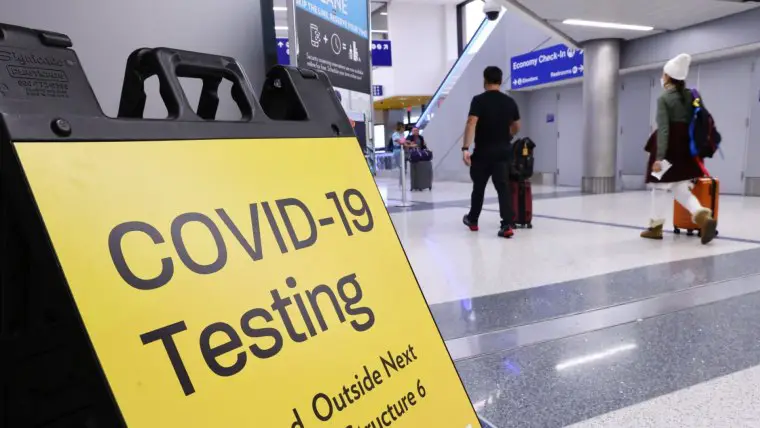As news broke late last week of a new Covid variant out of South Africa, called omicron, the world seemed to think that travel restrictions and more frequent testing would be enough to slow the spread. What most government and health officials didn’t know was that omicron was already well into Europe, and already well into the United States before doctors in southern Africa even announced their confirmed discovery.
Now, from New York to California, and even Hawaii, cases of the omicron variant are popping up all over the country. What this really means, of course, is that there are far more cases than just these confirmed few. It is not yet known what the ramifications are for vaccines or natural immunity:
In Hawaii, the variant was found in an unvaccinated O’ahu resident with moderate symptoms who had previously been infected with COVID-19, per a state health department statement. The variant has also been confirmed in California, Colorado and Minnesota.
In Minnesota, the variant was found in a vaccinated resident who recently traveled to New York City, Axios’ Torey Van Oot writes.
In California, the variant was detected in a traveler returning from South Africa who was fully vaccinated and has mild symptoms, according to the CDC. A second case was recorded in Los Angeles County on Thursday, the Los Angeles Times reports.
The third confirmed U.S. case of the newly-discovered Omicron variant was detected in a Colorado resident, state health officials said Thursday.
Omicron cases have also been confirmed across Europe, Canada, Israel, Hong Kong and Australia, among other countries, since the variant was first identified by scientists in South Africa last month.
As they would say, that escalated quickly. In days, we went from imposing travel restrictions on flights from eight African nations into discovering cases all around the country before the federal government even got its pants on.
In almost every example, the individual had been fully vaccinated, some with and some without booster shots. What’s clear is that vaccination provides little effect in terms of deterring infection or spread, though it likely helps keep the symptoms very mild. On the other hand, some accounts out of Africa believe that the vast majority of omicron cases are mild, perhaps more so than the delta variant. As viruses mutate to survive, they tend to become less deadly, but that rule is not always true.
At this point, travel restrictions and testing seem to be dubious steps at preventing the spread. If there is one case, there are probably ten, or more, behind it and so on. If omicron can spread more easily than delta, it would be safe to assume that even largely immune populations, whether by vaccination or natural immunity, can catch and spread the omicron variant as well from what is known so far, which is very little.
The big question is whether governments will overreact to this new variant. To their credit, most states have been reasoned in their response, although New York did issue a statewide state of emergency order to free up hospital beds and postpone elective surgeries, but has not changed much in the way of mask or vaccine policies.
New York Gov. Hochul insisted that at the moment, there’s no need to panic, but she did not rule out a new vaccine mandate:
Hochul stressed that there was no cause to panic, but urged New Yorkers to wear masks indoors and receive their vaccinations and boosters.
She added that contract tracing was starting. Two cases were in Queens, one in Brooklyn and a fourth, from a test on Nov. 30, in Suffolk County. The location of the fifth individual was unidentified.
Hochul said that she wasn’t ruling out a vaccine mandate if necessary, but added that there was not enough information yet to take that step.
As for the federal response, so far it consists of more masks and a wider booster shot campaign:
President Joe Biden’s administration will extend requirements for travelers to wear masks on airplanes, trains and buses and at airports and train stations through mid-March, sources briefed on the matter told Reuters, amid concerns about a new COVID-19 variant.
A formal announcement extending the requirements through March 18 is expected on Thursday, the sources said. The White House and the Transportation Security Administration (TSA) declined to comment. The TSA in August extended the transportation mask order through Jan. 18.
Biden plans to discuss the U.S. strategy for fighting COVID-19 this winter on Thursday and the transit mask extension is expected to be part of his remarks.
Basically, we can expect masking indefinitely in some instances, such as public transportation where the federal government can force the issue. The other possible change coming down the pike could be mandatory vaccination or testing for domestic air travel, something that could happen in weeks if the Biden administration thinks it can get away with it and not cause a serious backlash among airlines and passengers.
It remains to be seen how deadly omicron could be compared to delta or the original SARS-CoV-2 strain. If it’s similar in nature, or less lethal, then omicron may not be more than a small footnote in the Book of Covid. There will always be a new variant, and a new cause for government and media to create concern every few months, set your watch to it.
Many Americans are viewing the omicron variant unfold like they’ve watched other variants unfold: from afar while they go about their daily lives, intent on returning to normalcy while the world continues to go mad.
Donate Now to Support Election Central
- Help defend independent journalism
- Directly support this website and our efforts
